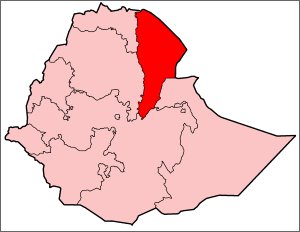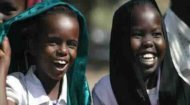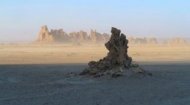Djibouti Nomads
Two thirds of Djibouti's population of 1.121 million (2022) live in the capital Djibouti, the rest are mainly nomads scratching out a living through herding. They are predominately Afar (see map right for the Afar region of Djibouti) who live in the arid north of the country and the Afar region of Ethiopia, and Issa nomads from Somalia. These nomads normally live in portable huts made from branches covered in woven mats that are able to be transported on the back of camels (above) when it's time to move on.It is believed that between 130,000 to 170,000 people live as nomads in Djibouti attempting to carve out a living with their sheep, goats and cattle. Over the past few years droughts across the Horn of Africa, where temperatures average ninety degrees and yearly rainfall is less than five inches, have rendered already poor agricultural land largely unusable and hundreds of thousands of animals have died through lack of water and food. In Djibouti most land is held by the government however the nomads claim their pastures through customary rights. Much of that land is now abandoned as the nomads search for a better existence in an area that is experiencing the worst drought and famine condition since the middle of the last century.
 Despite efforts by the Combined Joint Task Force - Horn of Africa (CJTF-HOA) to build wells to help support Djibouti Nomads, many are being forced to change their way of life simply to survive. There has been some criticism of the humanitarian aid offered to those suffering in the Horn of Africa on the grounds that providing food relief in itself creates new problems rather than addressing underlying issues. When food aid is delivered, it tends to be given to traditional nomad families who have sought out 'parked' population centres to receive this food, making the spreading of diseases more widespread. There are also concerns that the 'flooding' of the area with foreign foodstuffs is undermining the development of the local food economy and releasing governments from making the necessary reforms required to ensure sustainable communities with an effective food chain. Despite efforts by the Combined Joint Task Force - Horn of Africa (CJTF-HOA) to build wells to help support Djibouti Nomads, many are being forced to change their way of life simply to survive. There has been some criticism of the humanitarian aid offered to those suffering in the Horn of Africa on the grounds that providing food relief in itself creates new problems rather than addressing underlying issues. When food aid is delivered, it tends to be given to traditional nomad families who have sought out 'parked' population centres to receive this food, making the spreading of diseases more widespread. There are also concerns that the 'flooding' of the area with foreign foodstuffs is undermining the development of the local food economy and releasing governments from making the necessary reforms required to ensure sustainable communities with an effective food chain.
Additionally many of the Djibouti nomads, by definition, are inaccessible and there have been reports of nomads fighting nomads to secure food supplies provided by this aid. The video (above) while dated, explores the lives of nomads in Djibouti and vividly illustrates the near extinction of their lifestyle as they set out to literally find greener pastures; greener pastures that are, on a daily basis, turning to dust.
|

 Despite efforts by the Combined Joint Task Force - Horn of Africa (CJTF-HOA) to build wells to help support Djibouti Nomads, many are being forced to change their way of life simply to survive. There has been some criticism of the humanitarian aid offered to those suffering in the Horn of Africa on the grounds that providing food relief in itself creates new problems rather than addressing underlying issues. When food aid is delivered, it tends to be given to traditional nomad families who have sought out 'parked' population centres to receive this food, making the spreading of diseases more widespread. There are also concerns that the 'flooding' of the area with foreign foodstuffs is undermining the development of the local food economy and releasing governments from making the necessary reforms required to ensure sustainable communities with an effective food chain.
Despite efforts by the Combined Joint Task Force - Horn of Africa (CJTF-HOA) to build wells to help support Djibouti Nomads, many are being forced to change their way of life simply to survive. There has been some criticism of the humanitarian aid offered to those suffering in the Horn of Africa on the grounds that providing food relief in itself creates new problems rather than addressing underlying issues. When food aid is delivered, it tends to be given to traditional nomad families who have sought out 'parked' population centres to receive this food, making the spreading of diseases more widespread. There are also concerns that the 'flooding' of the area with foreign foodstuffs is undermining the development of the local food economy and releasing governments from making the necessary reforms required to ensure sustainable communities with an effective food chain.







